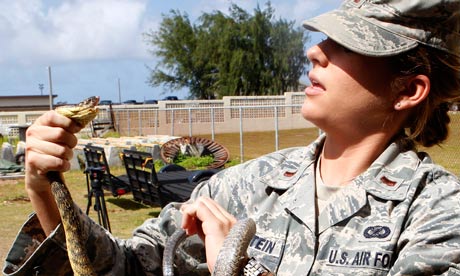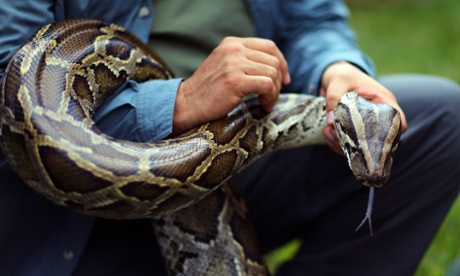Animal rights activists have dismissed as "absurd" and "cruel" the American government's plans to bombard Guam from the air with toxic dead mice in a bid to curtail the spread of invasive snakes.
The US air drop over the the Pacific island is due to commence in the spring, and is aimed at addressing the problems caused by non-native brown tree snakes. Having hitched a ride to the island some 60 years ago on military ships, the colony of reptiles have been deemed responsible for killing off native bird species, biting human inhabitants and knocking out electricity by slithering onto power lines.
Meanwhile, in Hawaii – some 3,000 miles away – environmentalists fear a similar invasion from the snakes, possibly through unwitting transportation in aircraft that have spent time on Guam.
But the US Department of Agriculture's plans to reduce the number of brown tree snakes in Guam – population estimates reach up to 2m – have been attacked by People for the Ethical Treatment of Animals (Peta).
Martin Mersereau, director of cruelty investigations at the animal rights organisation, described the plan as a "clumsy dangerous massacre".
"Brown tree snakes did not ask to be stowaways on planes or ships and then forced to survive on a foreign island," he said.
But irrespective of how they got to be on Guam, some residents say the snakes – which are native to Australia and Papua New Guinea – are a menace.
They can grow to be more than 10ft (3m) in length and can climb poles and trees. Attacks on people have been reported, but their venom is not lethal to humans.
Birds on the other hand are not so lucky. Experts believe that the reptiles have been responsible for the destruction of Guam's native birds, who are defenceless against the nocturnal, tree-based predators.
As well as taking a toll on native wildlife, the snakes also threaten the tourist industry of Guam, some fear. The US territory – home to some 160,000 people – relies heavily on holiday-making to support its economy.
The solution, government scientists believe, is to take advantage of the creature's two big weaknesses – its unfussiness when it comes to food and its susceptibility to a common painkiller, acetaminophen.
The drug – sold under the brand name Tylenol in the US – is harmless to humans, but is lethal to the snakes. And unlike other snakes, the brown tree variety do not turn their noses up at prey that has already been killed.
Scientists believe that stuffing dead mice with the drug and then conducting an air drop on areas known to be inhabited by the snakes would be an effective way to reduce their numbers.
"We are taking this to a new phase," said Daniel Vice, assistant state director of US Department of Agriculture's Wildlife Services in Hawaii, Guam and the Pacific Islands. "There really is no other place in the world with a snake problem like Guam," he added.
The mice drop – due to take place in April or May – will focus on Guam's sprawling Andersen air force base, from which it is feared snakes could hitch a ride off the island.
Using helicopters, the dead mice will be dropped by hand, one by one. In a bid to mitigate any danger to other animals, they will be fitted with mini-parachutes meant to catch on the branches of trees.
Supporters of the scheme say the impact on other animals will be minimal, especially as the snakes have successfully killed off many bird species.
But the brown tree snakes do have their defenders.
"Although the snakes are considered invasive, no animal should be forced to endure cruel death," Mersereau said.
If consumed, the drugged mice would cause renal and liver failure in the snakes, Peta claimed.
"For reptiles, death could take days or even weeks," Mersereau said. Moreover the method being used is "exceeding indiscriminate" and could cause "great risk to carnivours and scavengers and also to birds".
But it is a risk that US officials seem prepared to take. They point at the potential cost of allowing further colonies to breed in other Pacific islands like Hawaii.
A 2010 study conducted by the National Wildlife Research Center suggested that brown tree snakes would cause between $593m and $2.14bn in economic damage each year if they became established in Hawaii. Power outages would cause the most damage, followed by a projected decline in tourism.
To date, only a few brown tree snakes have ever been found in Hawaii, and none over the past 17 years.
The mice drop is intended to keep the number of stowaways to an absolute minimum. Even if they are to have their numbers reduced, Peta disagrees with the method.
Mersereau believes that it would be better to have the snakes trapped by trackers and then euthanised humanely than given a deadly last meal of toxic mice.







